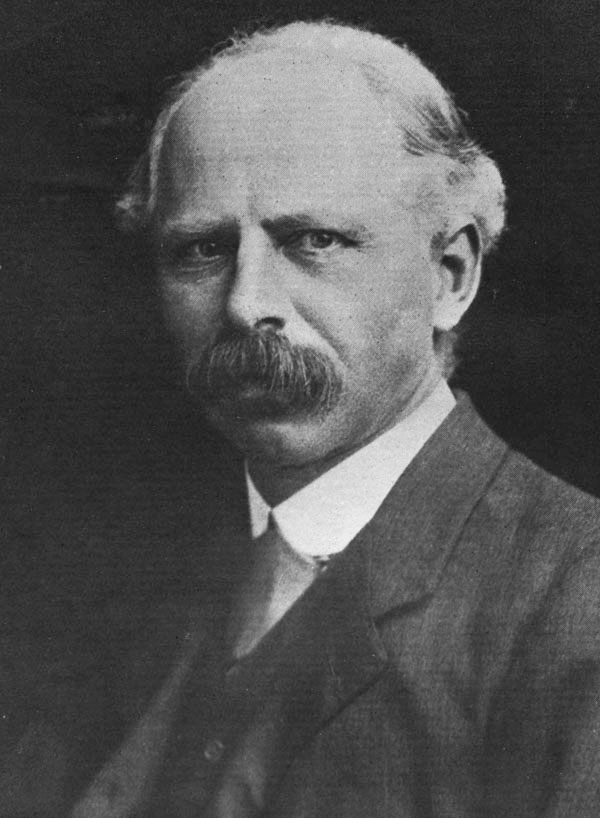“If the child was helpless, was the grown up person, man or woman, in a much better position?”
Source: Liberalism (1911), Chapter IV, "Laissez - Faire", p. 46.
Leonard Trelawny Hobhouse, né le 8 septembre 1864 à St Ives et mort à Alençon le 21 juin 1929, est un sociologue libéral britannique, un des théoriciens du libéralisme moderne.
Universitaire et journaliste, Hobhouse a été le premier professeur de sociologie à être recruté par une université britannique.
Sa conception de la sociologie s’inspire de sa connaissance des divers domaines tels que la philosophie, la psychologie, la biologie, l’anthropologie, l'histoire de la religion, l’éthique et le droit. Hobhouse est avec John Atkinson Hobson un des fondateurs du Nouveau libéralisme. Ce faisant, il a fourni la justification théorique à une certaine redistribution permise par les nouvelles pensions d’état en distinguant la propriété tenue « pour l’usage » de la propriété tenue « pour le pouvoir ». Son œuvre présente également une vision positive du libéralisme dans laquelle le but de la liberté est de permettre à des individus de se développer, et non seulement parce que cette liberté est bonne en soi. À cet égard, Hobhouse diffère de J. S. Mill qui considérait la non-intervention de l’état et de la société comme bonne en soi. Hobhouse, en revanche, indiquait que la coercition devrait être évitée non pas parce que nous n’avons aucun respect pour le bien-être des autres, mais parce que la coercition est inefficace à améliorer leur sort.
Wikipedia

“If the child was helpless, was the grown up person, man or woman, in a much better position?”
Source: Liberalism (1911), Chapter IV, "Laissez - Faire", p. 46.
Source: Liberalism (1911), Chapter VIII, Economic Liberalism, p. 89.
Source: Liberalism (1911), Chapter IV, "Laissez - Faire", p. 50.
Source: Liberalism (1911), Chapter VI, The Heart Of Liberalism, p. 69.
Source: Liberalism (1911), Chapter V, Gladstone And Mill, p. 56 .
Source: Liberalism (1911), Chapter IX, The Future Of Liberalism, p. 118.
“Great changes are not caused by ideas alone; but they are not effected without ideas.”
Source: Liberalism (1911), Chapter III, The Movement Of Theory, p. 30.
“We need less of the fanatics of sectarianism and more of the unifying mind.”
Source: Liberalism (1911), Chapter IX, The Future Of Liberalism, p. 126-127.
Source: Liberalism (1911), Chapter II, The Elements of Liberalism, p. 17.
“Government must keep the ring, and leave it for individuals to play the game.”
Source: Liberalism (1911), Chapter III, The Movement Of Theory, p. 34 .
Source: Liberalism (1911), Chapter I, Before Liberalism, p. 9.
Source: Liberalism (1911), Chapter V, Gladstone And Mill, p. 60.
Source: Liberalism (1911), Chapter IX, The Future Of Liberalism, p. 117.
Source: Liberalism (1911), Chapter II, The Elements of Liberalism, p. 17.
“In modern industry there is very little that the individual can do by his unaided efforts.”
Source: Liberalism (1911), Chapter VIII, Economic Liberalism, p. 99.
“The foundation of liberty is the idea of growth.”
Source: Liberalism (1911), Chapter VI, The Heart Of Liberalism, p. 66.
Source: Liberalism (1911), Chapter IV, "Laissez - Faire", p. 47.
Source: Liberalism (1911), Chapter I, Before Liberalism, p. 9.
Source: Liberalism (1911), Chapter VIII, Economic Liberalism, p. 97.
Source: Liberalism (1911), Chapter VI, The Heart Of Liberalism, p. 63.
Source: Liberalism (1911), Chapter III, The Movement Of Theory, p. 30.
Source: Liberalism (1911), Chapter II, The Elements of Liberalism, p. 16.
Source: Liberalism (1911), Chapter III, The Movement Of Theory, p. 34.
“Does scope for individual development, for example, consort with idea of equality?”
Source: Liberalism (1911), Chapter VII, The State And The Individual, p. 74 .